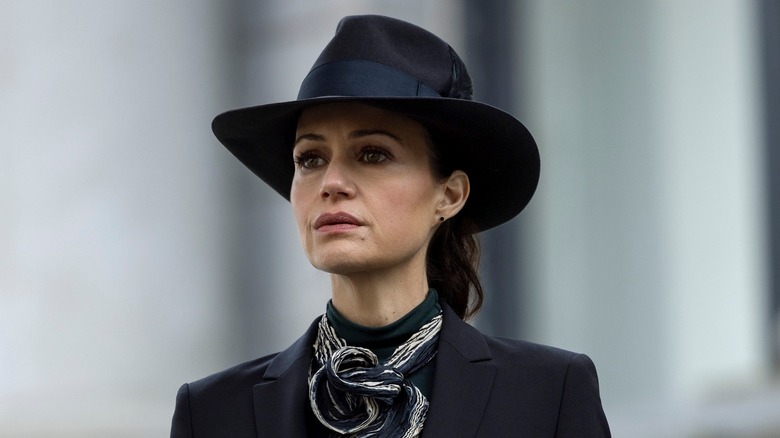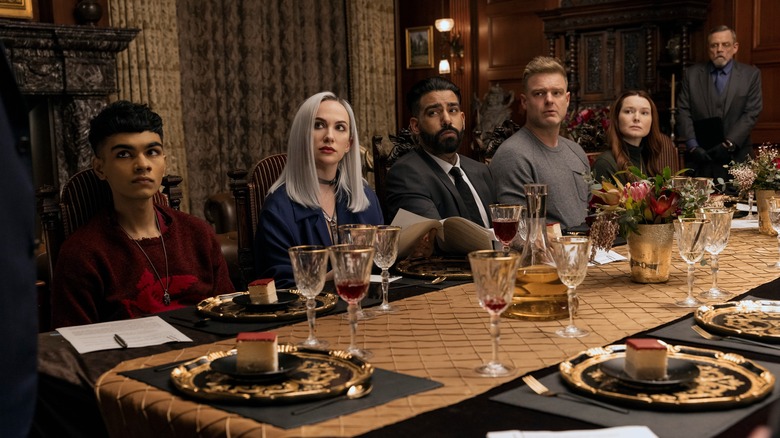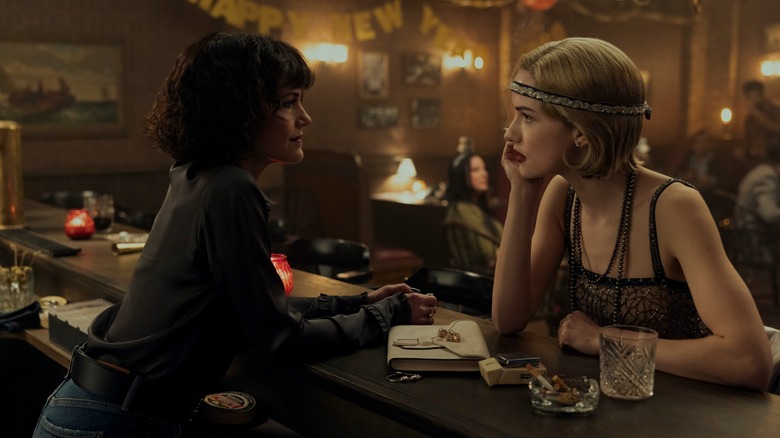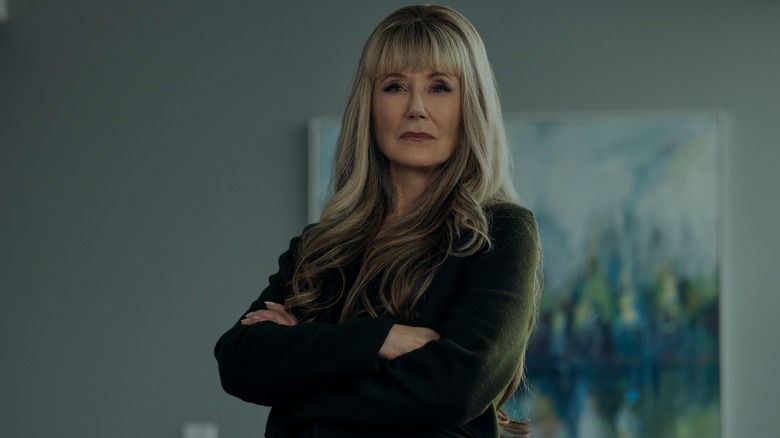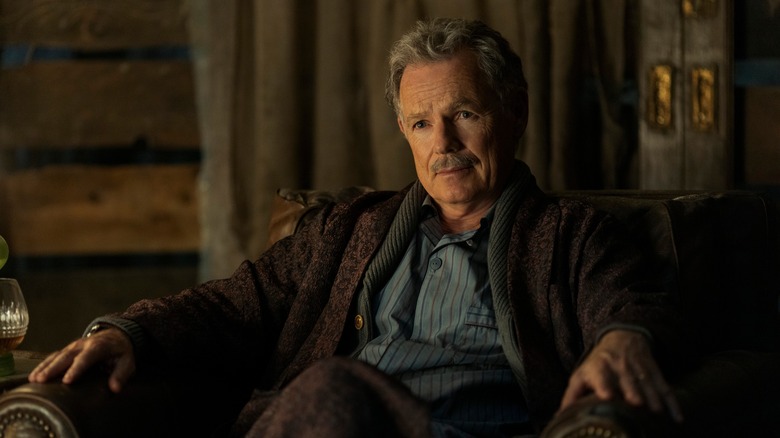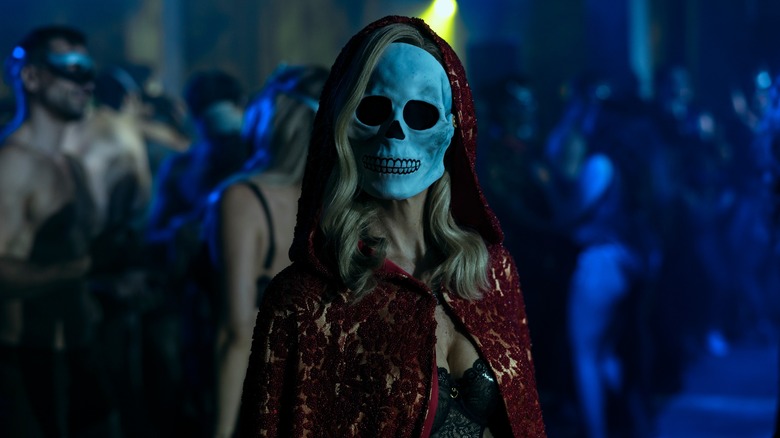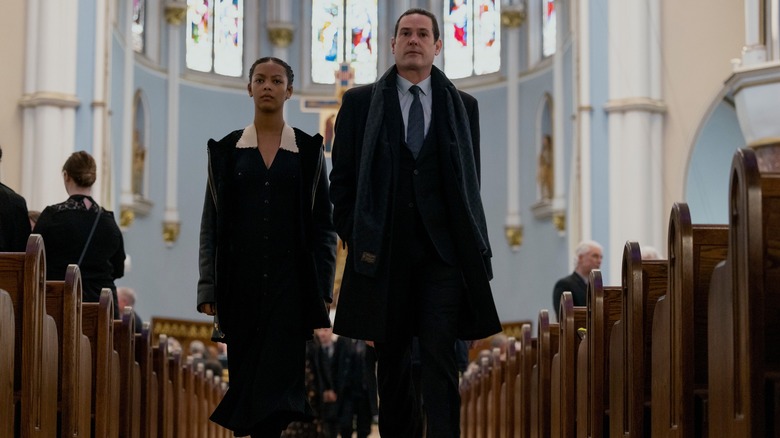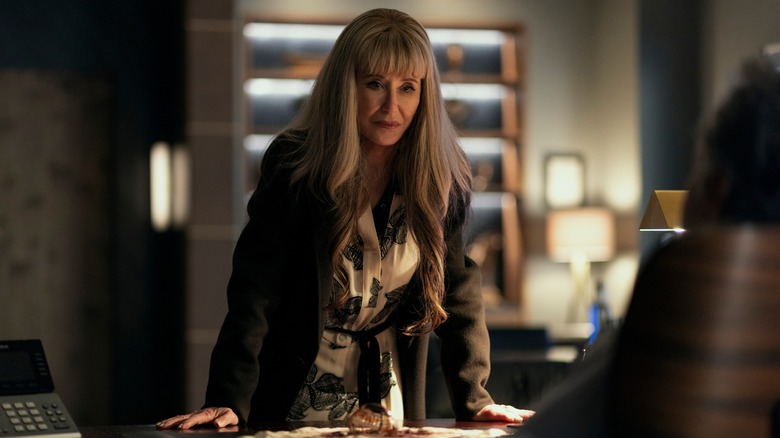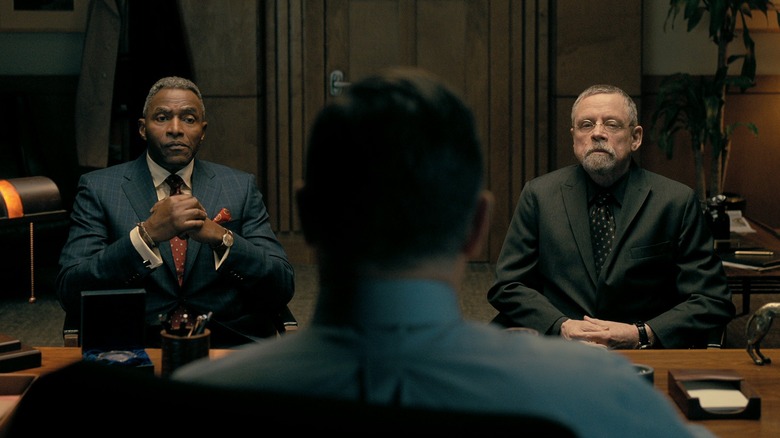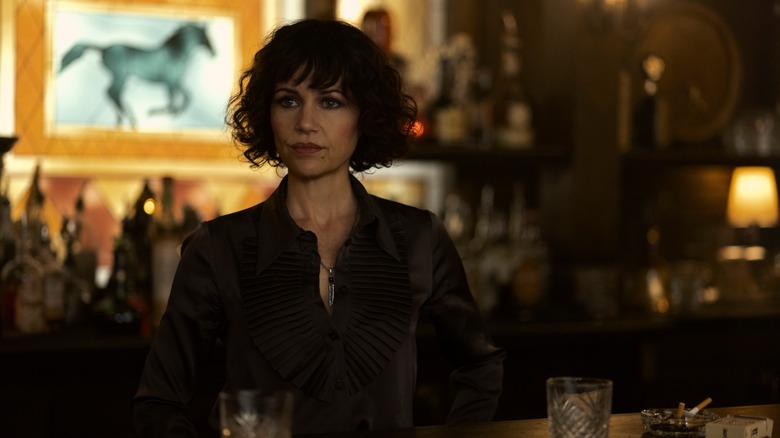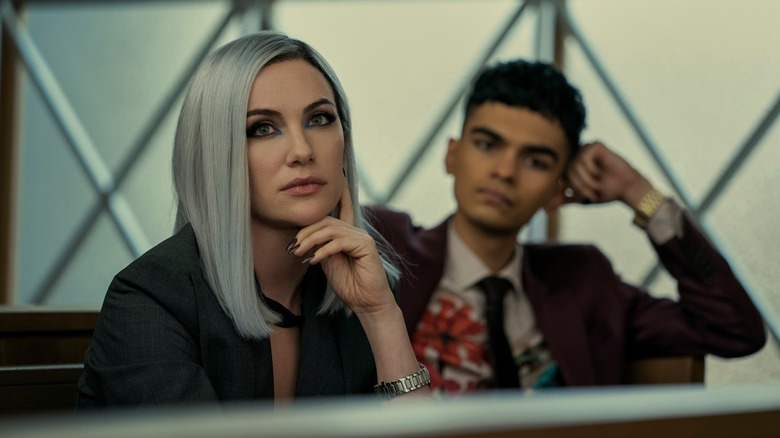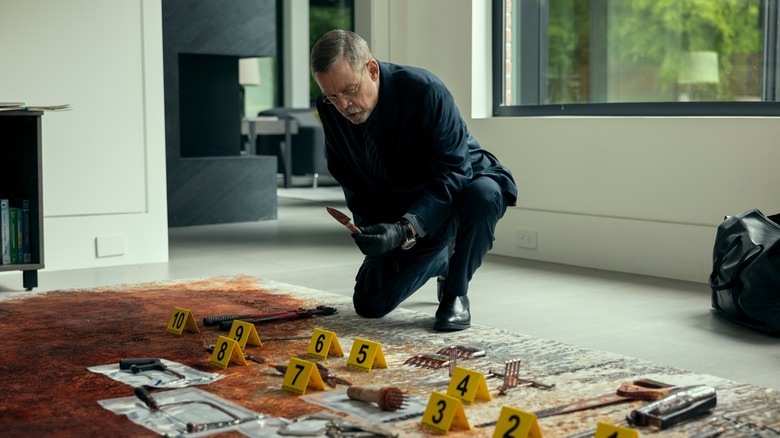The Ending Of The Fall Of The House Of Usher Explained
Contains spoilers for "The Fall of the House of Usher"
Creator Mike Flanagan returns to terrify and break hearts with the emotionally charged Netflix horror series "The Fall of the House of Usher." Inspired by Edgar Allan Poe's 1839 short story, but also taking influence from the author's other wicked works, this show explores the themes of wealth, legacy, and family in a way that puts all of its characters through the wringer and leaves no one unscathed.
Much like Flanagan's other series, he's assembled a powerhouse ensemble of actors and regular collaborators. Bruce Greenwood stars as Roderick Usher, while Zach Gilford plays the younger version of the character. Mary McDonnell portrays his sister Madeline, while Willa Fitzgerald appears as her younger self. In terms of Roderick's children, Samantha Sloyan, Henry Thomas, Kate Siegel, Rahul Kohli, T'Nia Miller, and Sauriyan Sapokota portray Tamerlane, Frederick, Camille L'Espanaye, Napoleon, Victorine LaFourcade, and Prospero respectively. Carla Gugino also stars as the mysterious Verna.
Throughout its eight episodes, the series slowly unravels significant details about the story, with the final episode proving to be the most revelatory of the lot. With that said, let's explore the importance of the ending of "The Fall of the House of Usher" and what it truly means.
What you need to remember about the plot of The Fall of the House of Usher
"The Fall of the House of Usher" splits its story across three timelines. The main narrative sees Roderick Usher provide his confession to his long-time investigator Auguste Dupin (Carl Lumbly), while they sit in the dilapidated Usher home. Roderick recalls the recent events that have claimed the lives of his children in mysterious fashion, which make up the second timeline, while he also explains how his past actions have led to their fates. Unsettling visions plague Roderick as he tells the harrowing story.
Interspersed between this conversation is a walk down memory lane to witness Roderick's and his twin sister Madeline's rise to power. We follow them from their humble beginnings and the tragic passing of their mother, Eliza, to their burning ambition to take over the pharmaceutical industry through the Fortunato company and a miracle painkiller known as Ligodone. A younger Dupin (Malcolm Goodwin) also features here, as he tries to convince Roderick to do the right thing and turn in the Fortunato CEO Rufus Griswold (Michale Trucco) for his shady dealings.
Across all timelines, one common denominator remains: A mysterious woman known as Verna, who appears to have the supernatural power to shapeshift and deliver wicked justice on the spoiled Usher children. However, the relationship between her, Roderick, and Madeline isn't made clear until the final episode, when all is revealed about how their paths crossed.
What happened at the end of The Fall of the House of Usher?
The title fall occurs in the series' eighth and final episode. Roderick Usher reveals to Auguste Dupin that he and his sister, Madeline, buried Fortunato CEO Rufus Griswold behind a wall. That evening, they headed to a bar to build an alibi. There, they met the bartender, Verna, who presented them with a Faustian deal: They will never suffer legal consequences for the rest of their lives and can use Fortunato for whatever they want — altruism or enrichment — but the price for this power is that their bloodline dies with them.
Madeline and Roderick accepted the deal, hence the deaths of his children. What breaks Roderick, though, is the passing of his granddaughter, Lenore (Kyleigh Curran), whom he regards as the best of everyone. That wakes him up to the gravity of their bargain. However, Verna recognizes the child's virtue and makes it painless, as she tells Lenore how her death will end up being the catalyst for millions of lives being saved in the future.
Back at the Usher house, Roderick confesses to Dupin that greed and ambition consumed his family, and he knew he would "climb to the top of the tower on a pile of corpses." He also reveals that he poisoned and killed Madeline, leaving her in the basement. However, she isn't dead, rising and strangling Roderick to death, as Dupin rushes out and watches the house of Usher collapse.
It literally is about the fall of the house
About as subtle as a hammer to the head, "The Fall of the House of Usher" doesn't play around with its message or theme. The title signifies both the end of the bloodline and the family's legacy. While Roderick and Madeline Usher are obsessed with taking over Fortunato — due to it being the company owned by their birth father, who never acknowledged their existence — and using it to build an unstoppable empire, it all comes to naught.
In fact, from their ashes, hope rises. The last remaining non-blood-related Ushers are Juno (Ruth Codd), Roderick's second wife, and Morelle (Crystal Balint), Frederick's wife and Lenore's mother. After their mistreatment by the family, they decide to use their inheritance for good rather than repeat the cycle of pain. Juno inherits Roderick's fortune, but she dismantles Fortunato and starts the Phoenix Foundation to help treat addiction, while Verna reveals that Morelle eventually recovers from her horrific injuries and inherits a sizable amount of money. Morelle gives most of it away, but she uses the rest to set up the non-profit Lenore Foundation, in honor of her daughter, which saves millions of lives around the world.
From a metaphorical point of view, these events symbolize how Roderick and Madeline fail to use their influence for the betterment of society as a whole. So, in the end, they are doomed to be forgotten. Quoth the Ushers, "Nevermore."
Roderick Usher learns the difference between money and wealth
The flashback sequences showcase Roderick Usher with his first wife, Annabel Lee (Katie Parker), and his eldest children, Tamerlane and Frederick. While the family isn't living in the lap of luxury or experiencing the lifestyle of the rich and famous, there are fleeting moments that indicate a pure happiness that is never reached again. The love between Roderick and Annabel comes across as genuine too, and judging by Roderick's poetic remembrance of her, is something he never finds with anyone else in his life after she leaves.
Roderick's obsession with power and money blinds him to what's important in life. Even when his children pass, he doesn't appear to be too devastated by their deaths since money has created a wedge between them all. They fail to appreciate each other, only focusing on what they can gain for selfish purposes. It's only when Roderick loses his granddaughter, who never asks for anything from him, that he realizes all the money in the world means nothing in the end.
After the death of the Ushers, Auguste Dupin summarizes the situation perfectly: he explains that he is set to go home and spend time with his family, which makes him the richest man in the world. For Roderick, he dies without his fortune or affection from his family. In essence, he perishes as the poorest man on Earth.
The Ushers are the harbingers of death
"The Fall of the House of Usher" addresses the opioid crisis and the controversial role of pharmaceutical companies valuing profits over health. While the young Roderick Usher believes in the power of Ligodone as a non-addictive painkiller, he realizes this is a fallacy and there never was an earnest intention to help others — only to make money by any means necessary.
In the final episode, Verna forces Roderick to come to terms with his actions at the Fortunato offices, as he witnesses hordes of bodies dropping from the high-rise building to the ground. She reminds him that these are all the deaths that the Ushers and Fortunato have caused over the decades, while building their empire on the suffering and pain of others.
On another level, both Madeline and Roderick are solely responsible for the deaths of their family. They doom their bloodline through their bargain with Verna, not once stopping to think of the long-term implications for short-term returns. For them, their ambition and immediate desires trump consequence or the ability to let others choose their own destinies. They ultimately become grim reapers, as they sentence their family members to death through their acts of selfishness and self-indulgence.
An alternate universe exists
The extent of Verna's powers remains unclear in "The Fall of the House of Usher," though there's no denying that she can see into the past, present, and future of every individual. In the seventh episode, during Frederick Usher's death, Verna reveals to him that an alternate future existed — if Roderick and Madeline hadn't accepted her offer — where he becomes a successful dentist. It all but indicates that events would have turned out differently for everyone had the Usher twins chosen differently on that fateful night.
Roderick and Madeline are aware of this, too, believing the end of their bloodline is a fair price to pay for ensuring their family never struggles in life. They would rather risk it all and embrace corruption in their favor than live with the anxiety of being ordinary and struggling to achieve anything.
However, there's yet another possible branch here. Even if the Ushers had taken Verna's offer, they also had the opportunity to turn Fortunato into a force for good. She leaves the choice in their hands. While it's unlikely the outcome would have been different — since a deal is a deal here — the Ushers might have left a better mark on the world through their actions and become revered for it rather than reviled.
The Usher twins aren't lovers
In Edgar Allan Poe's "The Fall of the House of Usher," the closeness of the relationship between Roderick and Madeline Usher has long been disputed. One school of thought suggests that they may share a strong psychic bond often found in stories about twins. However, a conflicting view presumes that they may have been lovers, paying tribute to the House of Lannister through inappropriate behavior behind closed doors.
The show also illustrates an extreme closeness between the siblings, as Madeline and Roderick appear to be glued at the hip in their early years while growing apart later on in their lives. However, any indication of them being lovers is quickly dispelled when Madeline reveals that she is attracted to women and has no interest in men. Plus the two never engage in any kind of behavior to suggest otherwise.
With regards to the Usher twins, Mike Flanagan and his team don't lean too much into them having any type of psychic link. Instead, he uses their mutual shared desire for power and ambition as the main driver for what brings and keeps them close. They believe Fortunato and its riches are their birthright and that they should become the king and queen of the company.
A smorgasbord of Edgar Allan Poe's stories
The short story "The Fall of the House of Usher" doesn't feature a large litany of protagonists and antagonists. In fact, the three main characters are Roderick Usher, his sister Madeline, and the unnamed narrator of the story. While the Netflix show utilizes certain elements from this premise, it also puts its own spin on matters by introducing a wealth of characters and themes from other Edgar Allan Poe tales.
For example, Auguste Dupin is based on C. Auguste Dupin, a detective from a few other Poe stories. On the show, Dupin steps into the narrator's spot, becoming the person whom Roderick spills the beans to. Similarly, the names of Roderick's children and several more characters take inspiration from figures introduced in Poe's poems and stories.
Arguably, the biggest addition to the show is Verna, which is an anagram for raven. "The Raven" remains one of Poe's most memorable works, having been turned into several films, including a 2012 adaptation directed by James McTeigue and featuring John Cusack as Poe. The poem boasts an infamous repetition of the word "nevermore," which has found its way into pop culture and even wrestling, with ECW legend Raven using it as his catchphrase.
What has the cast and crew of The Fall of the House of Usher said about the ending?
Due to the Screen Actors Guild–American Federation of Television and Radio Artists (SAG-AFTRA) and Writers Guild of America (WGA) strikes in the lead-up to the release of "The Fall of the House of Usher," most of the cast and crew remained mum about the series. At the same time, it's unlikely that they would have wanted to reveal too much in the first place, since the delicious twist at the end is something no one would want to spoil for the audience.
While the show was still in production, Carla Gugino teased the rollercoaster of emotions that the audience would experience. "It's bats*** crazy in the best possible way," she told Netflix. "It has quite a lot of very dark humor, but also really touches the soul." Gugino also explained how her character Verna played a major part, stating: "You could say she's the executor of fate or the executor of karma." Without anyone knowing any better, the actor pretty much gave away the ending right there.
What the end of The Fall of the House of Usher could mean for the franchise
Much like Mike Flanagan's other projects, "The Fall of the House of Usher" ends on a conclusive note and doesn't tease a second season. The story provides a definitive beginning, middle, and end — putting the Usher family six feet under by the time the credits roll. And no, there isn't a hand that pops out of the grave to signify someone will be back as a zombie.
Through Auguste Dupin's narration at the end of the final episode, he provides answers to any questions the audience may have about the fate of the remaining characters. He explains how Fortunato is no longer around and what Juno plans to do with her inheritance after she completes her own recovery and weans herself off Ligodone. In addition, he reveals how the Ushers' lawyer, Arthur Pym (Mark Hamill), serves a lifetime jail sentence and accepts it without any fight, as he takes the fall for Fortunato's controversial practices.
Dupin also discloses how his case is now shut and over. For most of his adult life, he was consumed with taking down the Ushers, but now with them being dead, he can finally rest and head off into a well-deserved retirement with his family.
The spin-off possibilities are endless
Since Mike Flanagan approached "The Fall of the House of Usher" as a wider tribute to Edgar Allan Poe's body of work, rather than a straightforward adaptation of the master of macabre's original short story, the possibilities for various spin-offs exist. First off, the most natural character to transition to other stories is Verna, aka The Raven. Since Verna is a shapeshifter, this means any potential further installments in Flanagan's Poe Universe could continue with or without Carla Gugino's involvement. However, after her phenomenal performance on the show, it's likely most fans would want to see her return and continue to strike bargains with other individuals at crossroads in their lives.
A second character that merits further exploration is Arthur Pym. In this story, Pym remains loyal to the Ushers and acts as their lawyer as well as their fixer. Pym doesn't feature in "The Fall of the House of Usher" short story, but he is from Poe's 1838 novel, "The Narrative of Arthur Gordon Pym of Nantucket." Elements of this tale feature in the retelling of Pym's enigmatic backstory, and his eyebrow-raising journey — filled with all sorts of horror and tribulation — could be turned into its own terrifying miniseries.
